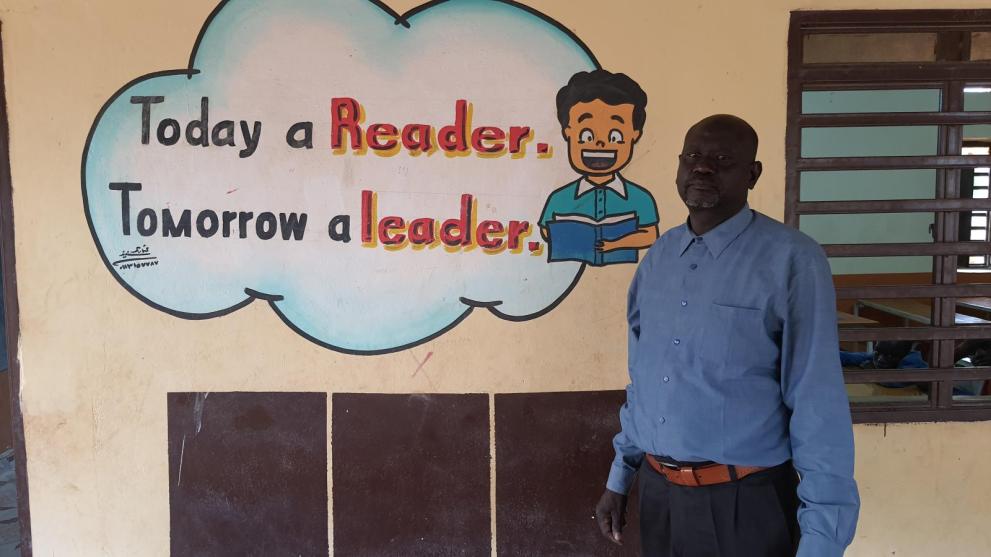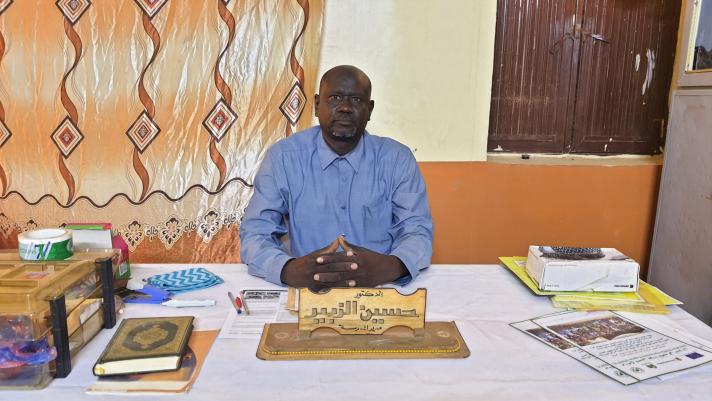
From an early age, Hussein had a passion for teaching and used to teach his younger siblings and other children from his neighborhood. He first started his teaching journey in 1993 as a teacher for the middle stage. Now aged 52, Hussein is the headmaster of Alizdihar Primary Public School and teacher for the primary stage. He explains the many challenges faced by the teachers in Sudan as well as his satisfaction with the recent improvements in his school.
Difficult teaching conditions in Sudan
According to the main international organisations and NGO’s working in Education, almost 7 million of Sudan’s children aged between six and 18 – or a third of school-age children – are out-of-school today. Despite all efforts, this figure has doubled in the last years following political and security instability, Covid 19 pandemic, weather hazards and social-economic hardship. This puts at risk the future of those kids and of the country as a whole.
“We are in dire need of teachers, currently we have children in primary and middle stages (8 classes) against six teachers only, which is far from enough,” says Hussein. Besides the lack of teachers, he deplores the insufficient qualifications: “When we asked the responsible body in the ministry, we found out they stopped teachers training programs 7-8 years ago”.
Teachers in Sudan are paid very low wages, generally not enough to cover a week’s expenses. Hussein shares his personal experience: “As a PhD holder, teacher and school principal, my salary is below 80,000 SDG (EUR 145). I have children in primary, secondary schools and college. I work extra hours in a private school to try and increase my sources of income.”
Hussein also notes the unavailability of school supplies and the very poor school infrastructure: “We need seating desks for children, as the current ones are 13+ years old and not suitable, almost scrap. As things stand, three, four and sometimes five children cram in one desk that is 180 cm long” regrets Hussein.
“We have to get our own electricity, water, chalk, pens, papers, water and whatever else needed. To the extent that when the Ministry of Education asks for a report, I go to the local market to write and print it, paying for it myself,” he adds.
Providing material support and training to Sudanese schools
The project EQUIP has assisted the Alizdihar Primary Public School since 2021. Hussein is particularly proud of the “two new classrooms and an office that enabled children to study in a beautiful environment that was the talk of the whole neighbourhood,” as well as the supplies received such as “chalk, which is very expensive and used to be purchased individually, copybooks and sportswear. The copybooks provided to children have been very helpful, earlier, children were unable to get copybooks for weeks” he points out.
Hussein is also grateful for “the physical and psychological support to students “and “training workshops for teachers and PTA members to guide on how to make the school’s environment appealing to children”.
According to him, the results speak for themselves: “We managed to prepare two classes for the state’s final exams, and the success rate was 81% and 65%”. “The success rate which I achieved as a principal has never been matched throughout the school’s lifetime, something which makes every teacher in the school and myself very proud” he adds.
Background / Project information
The project is implemented within the EU Education Quality Improvement Program II (EQUIP II) and fully funded by the European Union. It started in 2021 and continues till 2024, with the aim of improving the basic education sector in Sudan, with particular attention to the most marginalized groups living in vulnerable situations, including migrants, IDPs and refugees, especially girls, as well as children with disabilities. The project runs in four states; Khartoum, Blue Nile, Red Sea and South Kordofan, serving 180 schools and over 60,000 students.
Details
- Publication date
- 6 October 2022
- Region and Country
- Horn of Africa
- Sudan
- Thematic
- Strengthening resilience of communities
- Partner
- Save the Children

